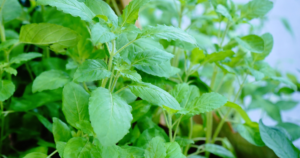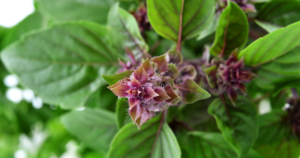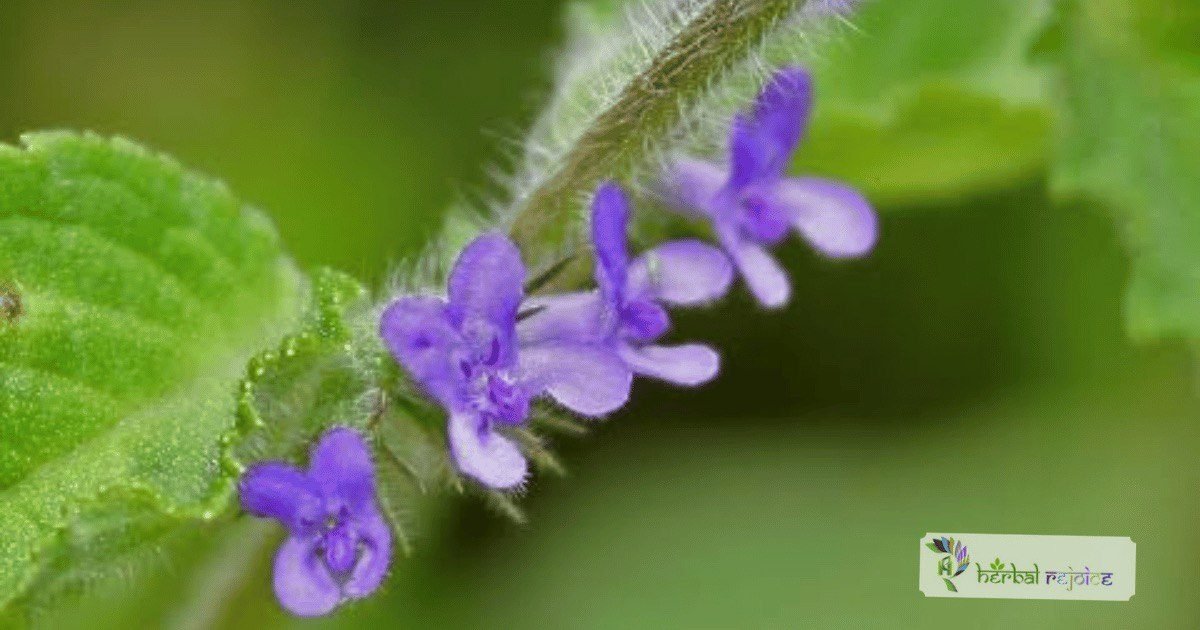In holistic healing, few herbs hold as much significance as Tulsi, also known as Holy Basil or Sacred Basil. With its roots deeply entwined in Ayurveda, the ancient Indian system of medicine, Tulsi offers many medicinal benefits and holds spiritual importance as a sacred herb to Hindus, revered for its purifying qualities.
In this article, we invite you to embark on a journey of discovering the wonders of Tulsi and how it can enrich your life with excellent health and vitality.
Unveiling the Essence of Tulsi
Synonyms: Sacred Basil, Holy Basil.
Biological Source: Tulsi, Ocimum sanctum Linn. (Syn. Ocimum tenuiflorum) belongs to the family Lamiaceae.
Geographical Source: Originating from India, this herbaceous, multi-branched annual plant is widely distributed and holds special religious significance for Hindus. People often cultivate it around temples.
Embracing the Macroscopic Character of Tulsi

Tulsi is a multi-branched small herb, standing 30-75 cm tall. Its leaves are oblong and acute, with entire or serrate margins, green in colour, and possess an aromatic flavour with a slightly pungent taste.
The purplish flowers appear in racemes, and the seeds are reddish-black and subglobose.
The Bountiful Chemical Constituents of Tulsi
Tulsi leaves the house a bright, yellow-coloured and pleasant volatile oil (0.1-0.9 per cent), primarily comprising approximately 70 per cent eugenol, alongside carvacrol, eugenol-methyl-ether, and caryophyllin.
Additionally, this sacred herb boasts alkaloids, glycosides, saponin, tannins, vitamin C, and traces of maleic, citric, and tartaric acid.
The Healing Uses of Holy Basil
Holy Basil offers a diverse range of medicinal applications with its leaves, juice, and volatile oil. It is an antibacterial and insecticidal agent and act as a stimulant, aromatic, anticatarrhal, spasmolytic, and diaphoretic.
The juice, particularly, finds its use in antiperiodic and various skin disease preparations. As an immuno-modulatory agent, Tulsi showcases expectorant and anti-inflammatory properties.
The Spiritual and Medicinal Significance of Holy Basil

Closely associated with Lord Vishnu, the Hindu god of preservation, Holy Basil embodies spiritual purity. Many Indian households cherish a living Tulsi plant, believing it provides divine protection.
Besides its spiritual essence, Holy Basil has a long history of culinary and medicinal use.
Traditionally, people use it to treat colds, flu, digestive issues, and more, attributing its effectiveness to its purifying actions.
The Botanical Marvel of Holy Basil
Growing up to eighteen inches, with oval serrated leaves and delicate lavender-coloured flowers, Holy Basil, native to the Indian subcontinent, finds its place on almost every continent.
The essential oil derived from its leaves contains eugenol, nerol, camphor, terpenes, flavonoids, and triglycerides with anti-inflammatory properties.
Embracing the Science of Tulsi: A Healing Journey
Research has revealed the antioxidant and anti-inflammatory properties of Holy Basil, with potential benefits for pain relief, arthritis, stress management, and heart protection. Additionally, its protective role against the toxicity of radiation and chemotherapy and its blood-sugar-lowering effects make it a promising aid in cancer and diabetes management.
Tulsi: Your Practical Companion for Holistic Wellness
1. Immune Booster and Stress Reliever: Tulsi leaves, taken as a strong tea, can alleviate colds, flu, and sore throats. As a stress-relieving herb, grow your Tulsi plant and nibble on its leaves daily to experience its health-promoting effects.
2. Diabetes and Digestion Support: Standard doses of Tulsi leaf powder have shown significant blood glucose reduction in patients with non-insulin-dependent diabetes mellitus (NIDDM). Its anti-ulcer properties make it beneficial for digestive health.
3. Natural Healing for Skin Conditions: Apply Tulsi leaf juice topically to soothe skin conditions, including allergic rashes and athlete’s foot, with its antibiotic effect aiding healing.
4. A Spiritual Aura for Your Home: Invite divine protection into your home by nurturing a living Tulsi plant, regarded as sacred and purifying by Hindus.
Ayurveda’s Take on Tulsi: Purity and Lightness
According to Ayurveda, Tulsi generates purity and lightness in the body. With a warming influence, it balances the Kapha dosha while pacifying Vata and Pitta. For those suffering from overheating, it may mildly aggravate Pitta.
Embracing Tulsi with Precaution
Holy Basil is generally safe for healing purposes. However, pregnant individuals or those attempting to conceive should avoid taking medicinal doses of Holy Basil, as some studies suggest a mild anti-fertility effect in animals.
In Conclusion: A Divine Journey to Holistic Wellness
Tulsi, the Sacred Basil, offers a profound connection between physical health, spiritual harmony, and mental well-being. Its rich history of traditional use and scientific evidence testify to its incredible healing potential.
By embracing Tulsi in your life, you unlock a path to greater vitality and well-being, nourishing your body, mind, and spirit. So, take a step towards holistic living and let the Sacred Tulsi embrace you in its nurturing essence.
Stay tuned for more enriching content on holistic healing, Ayurveda, and the power of nature’s remedies.
Frequently Asked Questions (FAQ) about Tulsi
What is Tulsi?
Tulsi, also known as Sacred Basil or Holy Basil, is a herbaceous, multi-branched annual plant found throughout India. It holds spiritual significance in Hindu culture and is revered for its purifying properties.
What are the chemical constituents of Tulsi?
Tulsi leaves a bright, yellow-coloured volatile oil comprising approximately 70 per cent eugenol alongside carvacrol and eugenol-methyl-ether. It also contains alkaloids, glycosides, saponin, tannins, vitamin C, and traces of maleic, citric, and tartaric acid.
How is Tulsi used traditionally?
The fresh leaves, juice, and volatile oil of Tulsi used for various purposes. The oil is known for its antibacterial and insecticidal properties, while the leaves act as stimulant, aromatic, and diaphoretic.
What are the macroscopic characteristics of Tulsi?
Tulsi is a 30-75 cm tall multi-branched small herb with oblong, acute leaves. The leaves are green, possess an aromatic flavour, and have a slightly pungent taste. The flowers are purplish, forming racemes, and the seeds are reddish-black and subglobose.
How does Tulsi benefit Parkinson’s disease patients?
Tulsi generates L-dopa, a dopamine precursor chemical, which effectively treats Parkinson’s disease. Patients taking Tulsi have demonstrated substantial reductions in their symptoms and improved quality of life.
Is Tulsi helpful in managing diabetes?
Yes, animal studies and research on patients with non-insulin-dependent diabetes mellitus (NIDDM) have shown that Tulsi has significant blood-sugar-lowering effects.
How does Tulsi protect the heart during chemotherapy?
Tulsi protects the heart from damage caused by chemotherapy drugs, such as adriamycin, by shielding heart and liver cells from oxidative harm caused by free radicals.
Can Tulsi be used for stress relief?
Yes, Tulsi dampens the effects of stress on physiology. It influences the brain’s neurochemistry and exhibits properties similar to antidepressant medications.
Does Tulsi have antioxidant properties?
Yes, Tulsi has antioxidant activity and can neutralize free radicals and inhibit the formation of inflammatory prostaglandins.
How can I use Tulsi for immune support?
Prepare a strong Tulsi tea by brewing one tablespoon of dried leaves per pint of hot water and sipping it throughout the day to boost your immune system.
Can Tulsi be beneficial for digestive health?
Yes, Tulsi has been traditionally used to soothe digestive issues like heartburn and bloating. It possesses significant anti-ulcer activity and increases the production of protective stomach mucus.
Is Holy Basil the same as Sweet Basil?
Though related, Holy Basil (Ocimum sanctum) and Sweet Basil (Ocimum basilicum) are different plants. Both share medicinal properties, but Holy Basil has deeper spiritual significance in Ayurveda.
How do I grow my own Tulsi plant?
To grow Tulsi:
- Put the seeds in warm, damp paper towels for a day.
- Plant them about half an inch deep in good-quality potting soil.
- Once it reaches a foot in height, pinch any flowers to maintain the plant.
Can I use Tulsi for skin conditions?
Yes, the juice of Tulsi leaves can be applied topically to soothe skin conditions, including allergic rashes and athlete’s foot, due to its antibiotic effect.
Is Tulsi safe for pregnant women?
While Holy Basil is generally safe for most individuals, pregnant women or those trying to conceive should avoid taking medicinal doses of Tulsi, as some studies suggest a mild anti-fertility effect in animals.
How does Tulsi benefit cancer patients undergoing radiation and chemotherapy?
Tulsi safeguards normal cells from the harmful effects of chemotherapy and radiation, as well as restricts chromosomal harm in animals.
Can Tulsi lower cholesterol and triglyceride levels?
Yes, Tulsi lowers cholesterol and triglyceride levels, making it beneficial for individuals with high cholesterol.
Is Tulsi an effective birth control agent?
Tulsi has been suggested to have birth-control properties, but further research is needed to establish its effectiveness.
What is the traditional Ayurvedic role of Tulsi?
Ayurveda considers Tulsi to generate purity and lightness in the body. It has a predominantly Kapha-reducing effect and can pacify Vata and Pitta.
Does Tulsi have an anti-inflammatory effect?
Yes, Tulsi possesses anti-inflammatory properties that can help relieve pain and inflammation.
Can I use Sweet Basil instead of Holy Basil for medicinal purposes?
Though less extensively studied than Holy Basil, Sweet Basil does share many of the same medicinal properties and can be used as a substitute.
How can Tulsi enhance the immune response?
Tulsi enhances different aspects of animal immune response, making it valuable for overall immune support.
Is Tulsi helpful for individuals with arthritis?
Tulsi’s antioxidant and anti-inflammatory properties may aid in managing pain and arthritis symptoms.
What is the recommended dosage of Tulsi for diabetes management?
In a study, patients with diabetes took 2.5 grams of dried Tulsi leaf powder every morning to significantly reduce blood glucose levels.
Conclusion: Harnessing the Power of Tulsi for Holistic Well-being
Tulsi, the Sacred Basil, encompasses both spiritual significance and immense medicinal benefits. Its potential in managing various health conditions, such as diabetes, stress, cancer, and digestive issues, makes it a valuable herb for holistic well-being.
Whether in herbal teas, extracts, or fresh leaves, incorporating Tulsi into your daily life can unlock the key to a healthier and vibrant existence.
Disclaimer: The details given are meant exclusively for educational reasons and should not be considered a method for diagnosing, treating, or curing medical conditions. It’s important to consult a healthcare expert before using Tulsi or any herbal remedy for medical reasons.





